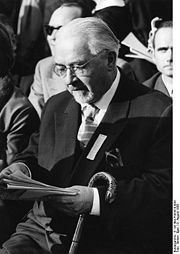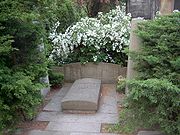
Otto Nuschke
Encyclopedia


Germans
The Germans are a Germanic ethnic group native to Central Europe. The English term Germans has referred to the German-speaking population of the Holy Roman Empire since the Late Middle Ages....
politician
Politician
A politician, political leader, or political figure is an individual who is involved in influencing public policy and decision making...
.
Nuschke was born in Frohburg
Frohburg
Frohburg is a town in the Leipzig district, in the Free State of Saxony, Germany. It is situated 11 km northeast of Altenburg, and 34 km southeast of Leipzig. It includes the village of Flößberg.- History :...
in the Kingdom of Saxony
Kingdom of Saxony
The Kingdom of Saxony , lasting between 1806 and 1918, was an independent member of a number of historical confederacies in Napoleonic through post-Napoleonic Germany. From 1871 it was part of the German Empire. It became a Free state in the era of Weimar Republic in 1918 after the end of World War...
. In 1910 he was elected General Secretary of the liberal Progressive People's Party (Fortschrittliche Volkspartei) of Kassel
Kassel
Kassel is a town located on the Fulda River in northern Hesse, Germany. It is the administrative seat of the Kassel Regierungsbezirk and the Kreis of the same name and has approximately 195,000 inhabitants.- History :...
. In the same year he became chief editor of the Berliner Tageblatt
Berliner Tageblatt
The Berliner Tageblatt or BT was a German language newspaper published in Berlin from 1872-1939. Along with the Frankfurter Zeitung, it became one of the most important liberal German newspapers of its time.-History:...
and in 1915 co-editor of the Berliner Volkszeitung.
Nuschke soon joined the Liberal Union (Freisinnige Vereinigung), left-wing liberal organisation, and became its general secretary of Kassel
Kassel
Kassel is a town located on the Fulda River in northern Hesse, Germany. It is the administrative seat of the Kassel Regierungsbezirk and the Kreis of the same name and has approximately 195,000 inhabitants.- History :...
in 1906. As this group fused with other left-liberal organisations (in 1910) to form the Progressive People's Party
Progressive People's Party (Germany)
The Progressive People's Party was a liberal party of late Imperial Germany. It was formed in 6 March, 1910 as a merger of Freeminded People's Party, Freeminded Union, and German People's Party in order to unify the various liberal groups represented in parliament...
, Nuschke became the general secretary of the new party in Kassel
Kassel
Kassel is a town located on the Fulda River in northern Hesse, Germany. It is the administrative seat of the Kassel Regierungsbezirk and the Kreis of the same name and has approximately 195,000 inhabitants.- History :...
.
In 1918 he took part in establishing the German Democratic Party. In 1919 he was a delegate of the German Democratic Party to the National Congress of Weimar
Weimar
Weimar is a city in Germany famous for its cultural heritage. It is located in the federal state of Thuringia , north of the Thüringer Wald, east of Erfurt, and southwest of Halle and Leipzig. Its current population is approximately 65,000. The oldest record of the city dates from the year 899...
and from 1921 to 1933 he was a member of the Reichstag
Reichstag (Weimar Republic)
The Reichstag was the parliament of Weimar Republic .German constitution commentators consider only the Reichstag and now the Bundestag the German parliament. Another organ deals with legislation too: in 1867-1918 the Bundesrat, in 1919–1933 the Reichsrat and from 1949 on the Bundesrat...
for the German Democratic Party. In 1920s Nuschke was at times the deputy chairman of the German Democratic Party. Nuschke was one of the founders of the republican Reichsbanner Schwarz-Rot-Gold
Reichsbanner Schwarz-Rot-Gold
The Reichsbanner Schwarz-Rot-Gold was a Social Democratic paramilitary force formed during the Weimar Republic in 1924....
and became the general secretary of the German State Party
German State Party
The German State Party was a short-lived German political party of the Weimar Republic, formed by the merger of the German Democratic Party with the People's National Reich Association in July 1930...
in 1931 (i.e. a successor to the German Democratic Party).
After the Nazis
Nazism
Nazism, the common short form name of National Socialism was the ideology and practice of the Nazi Party and of Nazi Germany...
gained power in 1933 Nuschke joined the opposition. After the 1944 assassination attempt on Hitler
Adolf Hitler
Adolf Hitler was an Austrian-born German politician and the leader of the National Socialist German Workers Party , commonly referred to as the Nazi Party). He was Chancellor of Germany from 1933 to 1945, and head of state from 1934 to 1945...
's life, he went into hiding.
Directly after World War II
World War II
World War II, or the Second World War , was a global conflict lasting from 1939 to 1945, involving most of the world's nations—including all of the great powers—eventually forming two opposing military alliances: the Allies and the Axis...
, he became involved in the politics of the Soviet Occupation Zone (SBZ). Unlike most of the former German Democratic Party members, Nuschke did not take part in forming the LDPD/FDP
Free Democratic Party (Germany)
The Free Democratic Party , abbreviated to FDP, is a centre-right classical liberal political party in Germany. It is led by Philipp Rösler and currently serves as the junior coalition partner to the Union in the German federal government...
, but became one of the co-founders of the Christian Democratic Union
Christian Democratic Union (East Germany)
The Christian Democratic Union of Germany ) was an East German political party founded in 1945. It was part of the National Front with the Socialist Unity Party of Germany until 1989....
(CDU) in June 1945, similarly to Ferdinand Friedensburg
Ferdinand Friedensburg
Ferdinand Friedensburg was the interim Mayor of Berlin due to the illness of mayor Louise Schroeder during the Berlin Blockade in 1948.-Biography:...
, Ernst Lemmer and Walther Schreiber
Walther Schreiber
Walter Schreiber was a German politician and was Mayor of Berlin from 1953 to 1955.He was a member of the Christian Democratic Union Party.-External links:...
. In 1946 Nuschke was elected in the party's executive committee. From 1946 to 1952 he was a member of the Landtag of Brandenburg
Landtag of Brandenburg
The Landtag of Brandenburg is the unicameral legislature of the state of Brandenburg in Germany.It has 88 members of parliament, currently belonging to four parties.-History:...
. In 1947, after the deposition of party chairmen Jakob Kaiser
Jakob Kaiser
Jakob Kaiser was a German politician and resistance leader during World War II.Jakob Kaiser was born in the Franconian town of Hammelburg. Following in his father’s footsteps, Kaiser began a career as a bookbinder...
and Ernst Lemmer by the Soviet military authorities, Nuschke became acting chairman and after the party congress of 1948, chairman of the CDU (SBZ)
Christian Democratic Union (East Germany)
The Christian Democratic Union of Germany ) was an East German political party founded in 1945. It was part of the National Front with the Socialist Unity Party of Germany until 1989....
.
In March 1948, Nuschke - alongside Wilhelm Pieck
Wilhelm Pieck
Friedrich Wilhelm Reinhold Pieck was a German politician and a Communist. In 1949, he became the first President of the German Democratic Republic, an office abolished upon his death. He was succeeded by Walter Ulbricht, who served as Chairman of the Council of States.-Biography:Pieck was born to...
(SED) and Wilhelm Külz
Wilhelm Külz
Wilhelm Külz was a German politician . In 1926 he was interior minister of the Weimar Republic. After 1945 he took actively part in establishing the LDPD...
(LDPD) - was chairman of the German People's Council (Deutscher Volksrat) that composed the Constitution of the German Democratic Republic
German Democratic Republic
The German Democratic Republic , informally called East Germany by West Germany and other countries, was a socialist state established in 1949 in the Soviet zone of occupied Germany, including East Berlin of the Allied-occupied capital city...
. In 1949 Nuschke became member of the Provisional People's Chamber of the GDR. He belonged to the parliament (Volkskammer) until his death.
A loyal supporter of the SED
Socialist Unity Party of Germany
The Socialist Unity Party of Germany was the governing party of the German Democratic Republic from its formation on 7 October 1949 until the elections of March 1990. The SED was a communist political party with a Marxist-Leninist ideology...
regime, Nuschke became after the establishment of the German Democratic Republic
German Democratic Republic
The German Democratic Republic , informally called East Germany by West Germany and other countries, was a socialist state established in 1949 in the Soviet zone of occupied Germany, including East Berlin of the Allied-occupied capital city...
Deputy Prime Minister and chief of the Church Office of the GDR.
On 17 June 1953, during the East German uprising
Uprising of 1953 in East Germany
The Uprising of 1953 in East Germany started with a strike by East Berlin construction workers on June 16. It turned into a widespread anti-Stalinist uprising against the German Democratic Republic government the next day....
, Nuschke and his driver were kidnapped and brought to West Berlin
West Berlin
West Berlin was a political exclave that existed between 1949 and 1990. It comprised the western regions of Berlin, which were bordered by East Berlin and parts of East Germany. West Berlin consisted of the American, British, and French occupation sectors, which had been established in 1945...
. Some American military recognised him and saved him from the angry masses. He and his driver were brought to a police station, but released on 19 June. After that Nuschke and his driver returned to East Berlin
East Berlin
East Berlin was the name given to the eastern part of Berlin between 1949 and 1990. It consisted of the Soviet sector of Berlin that was established in 1945. The American, British and French sectors became West Berlin, a part strongly associated with West Germany but a free city...
. In a spontaneous interview given to RIAS
RIAS
RIAS can stand for one of the following:*Rias, the plural of Ria, a lower river valley submerged by the sea*"Research Institute for Advanced Study", the former research facility created by the Glenn L...
reporter Peter Schultze, Nuschke claimed that the East German government had popular support and that the demonstrators included West-Berliners.
In 1954 he received the Patriotic Order of the GDR and in 1955 he received an honorary degree.

